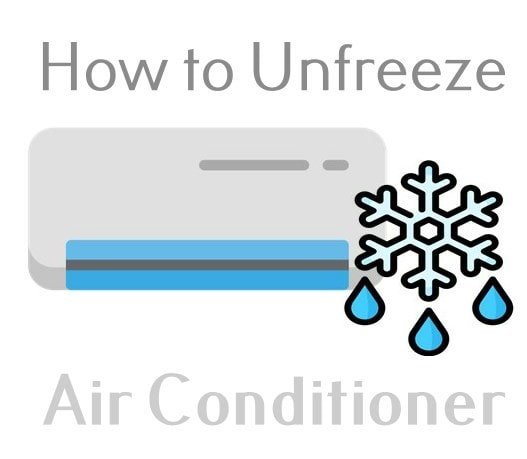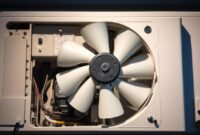In the often-unforgiving summers, many homeowners in warm nations rely on air conditioners to keep their homes cool. However, if you notice ice on your air conditioner, it’s a sign that it’s frozen over. Both indoor and outdoor air conditioners can freeze. We will show you how to unfreeze an air conditioner step by step.
How to Unfreeze an Air Conditioner
- The first thing you should do is turn off your air conditioner. Yes, it’s sweltering outside. Frozen AC parts, on the other hand, are terrible news for the most expensive component of your HVAC system or what we know as the compressor. Turn your thermostat from cool to off to avoid long-term harm and a high bill. The defrosting process will begin at this point.
- Secondly, turn on the fan. Turning on the HVAC fan forces it to push warm air over any frozen coils, speeding up the defrost process. Check to see whether it’s set to ‘on’ rather than ‘auto’. The fan will cycle through its settings, beginning and stopping again. Continuous, nonstop airflow over the frozen portions is required. If your frozen air conditioner isn’t blowing cool air, turn the AC off and wait 24 hours for the ice to thaw before trying to turn it on again.

- Whether it is a window AC or your inside AC unit. What caused your air conditioner to break down in the first place? The most common causes are leaking refrigerant, dirty air filters, evaporator coils that are filthy, spare parts problems, and other issues.
- If you see a leak anywhere, it’s most likely the source of your ice. Low refrigerant levels lead to pressure reductions, which allows moisture in the air to freeze around your HVAC coils. Unlike what many homeowners believe, refrigerant does not simply “run out.” It doesn’t degrade with time, and it doesn’t evaporate when the air conditioner is turned on. If you’re running low on refrigerant, you almost certainly have a leak. Refrigeration fluid is a dangerous substance that should only be handled by qualified professionals. If you suspect a leak, you should get professional assistance.
- If your freezing AC is caused by a dirty air filter, clogged filters can effectively smother your HVAC system. When warm air is limited from your unit’s coils, the coils become too cold and freeze over. To avoid freezing, replace air filters at least once a month.
Read also: What Causes Air Conditioner Humming Inside?
- The same thing happens if your coils are unclean. In the same way, dust in your filter restricts airflow, dirt, and grime coat the evaporator coils.
- Finally, keep an eye on the important matter. You may experience some collateral damage while your HVAC unit thaws out. When there is this much water coming out of your AC, overflowing drain pans and clogged condensation drains are a possibility. To avoid water damage, lay down some towels around the unit and keep an eye out for any future leaks.
You can turn your air conditioner back on once it is entirely free of ice and all parts are dry. Over the next several hours to a few days, keep an eye on the device for any further issues.
However, there are some tips to help prevent your AC from becoming frozen. First, the air conditioner’s filter should be cleaned. If the filter hasn’t been changed in more than a month, replace it rather than clean it.
Secondly, contact an HVAC professional to check the refrigerant and, if necessary, recharge it. An HVAC professional can also check your system for refrigerant leaks and repair them if any are discovered. You can perform this tip when you feel there’s something odd with your AC.
Read also: 3 Causes of Outside Air Conditioner Unit Frozen
Thirdly, maintain a temperature of at least 78 degrees Fahrenheit (26 degrees Celsius) in your air conditioning system. This is the ideal temperature for your thermostat to be set to. When it’s hot outdoors, it keeps your house cool without causing the air conditioner to overheat.
If the ice buildup in your air conditioning unit persists, after following this “how to unfreeze an air conditioner” instruction, you may need to call in an air conditioning repair technician. In addition to repair services, be sure the technician offers preventative maintenance to ensure that your air conditioner runs smoothly throughout the summer season.


